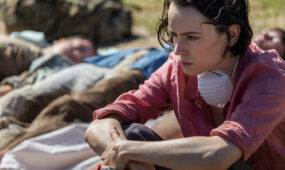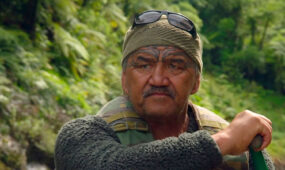Everest tragedy recreated in new thriller
Film & TV

New Zealand mountaineer Rob Hall conquered Mount Everest five times before losing his life in 1996 in what is described as one of the mountain’s worst climbing disasters.
He had reached the south summit and was still some 8700m up the mountain, staying with a stricken client, when he succumbed to fatigue and frostbite amid a brutal and unrelenting snowstorm.
Eight other climbers, including three members of the team he had been leading, died the same day.
Now the story of the mission has been recreated in Everest, a visually stunning, edge-of-the-seat thriller by Icelandic director Baltasar Kormákur.
In terms of landscape and drama, Everest has similarities to the acclaimed Touching the Void, about the attempt by two young climbers to reach the summit of Siula Grande in Peru. But while that was a documentary, this latest mountain epic is a dramatisation boasting a top-notch cast including Australian actors Jason Clarke (Dark Zero Thirty; Dawn of the Planet of the Apes) and Sam Worthington, Josh Brolin, Jake Gyllenhaal, Robin Wright, Keira Knightley and Emily Watson.
Experienced mountaineer Hall (played by Clarke) is the central figure of the story, which has been endorsed by his wife, Jan Arnold, herself a climber, who attended the world premiere at the Venice Film Festival with the couple’s daughter, Sarah.
Everest begins with Hall farewelling the seven-months-pregnant Arnold (Knightley) in New Zealand and heading to Nepal for the latest expedition with his mountain-guiding company Adventure Consultants.
Those along for the climb include Texan pathologist Beck Weathers (Brolin), journalist Jon Krakauer (House of Cards’ Michael Kelly), postman Doug Hansen and Japanese businesswoman Yasuko Namba.
They begin their acclimatisation at the Base Camp, which is presented as a sprawling, shambolic place swarming with colourful climbers of varying experience levels from all over the world who have one goal in mind: conquering Everest.
But congestion on the mountain poses added risks, and there are already unsubtle hints of what is to come. Hall, portrayed as a stickler for safety, convinces American guide Scott Fischer (Gyllenhaal), who runs his own Mountain Madness company, that it would be a smart move for the two teams to climb together.
Breathtaking cinematography (the film was shot in Nepal, the foothills of Everest and the Italian Alps) and 3D effects add to the sense of foreboding. This is a beautiful yet harsh world of seemingly bottomless crevasses, cloud-shrouded peaks, sheer ice walls, crashing avalanches and volatile weather, all presided over by a 29,029-foot mountain that has claimed many lives.
“They call it the death zone for a reason,” Hall tells his team, describing the gruelling final few thousand feet to the summit.
So what drives the climbers to strive for the impossible dream? It’s a question posed early in the film by Krakauer, who planned to write a story about the growing popularity of commercial expeditions to Everest, and later wrote a book about the mission titled Into Thin Air. None of the answers he is given seem entirely satisfactory. Maybe, as Clarke’s Hall suggests, it is beyond the power of words to describe.

Get InReview in your inbox – free each Saturday. Local arts and culture – covered.
Thanks for signing up to the InReview newsletter.
The levity of Base Camp (complete with Crowded House soundtrack) disappears once the real assent begins. Taut direction and excellent performances – especially by Clarke, Brolin and Emily Watson as camp manager and radio operator Helen Winton – capture both the stoicism and increasing desperation of all involved as the mission turns from a bid to summit into a fight for survival.
It’s nail-biting stuff; every breath is a struggle, every decision and error has potentially fatal consequences.
The blizzard, amplified by cracking sound effects, feels real – so much so that sometimes it is difficult for the audience to follow exactly what is happening amid the confusion. The communications with family back home are heart-breaking.
This is one case where the film company’s promise of an incredible true story is not hyperbole, but Everest would be worth seeing for the cinematography alone. It’s a big-screen must.
Support local arts journalism
Your support will help us continue the important work of InReview in publishing free professional journalism that celebrates, interrogates and amplifies arts and culture in South Australia.
Donate Here





Comments
Show comments Hide comments